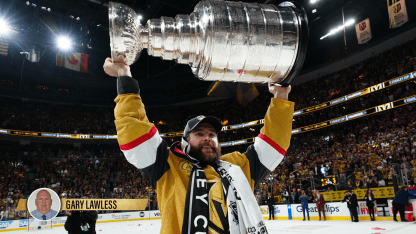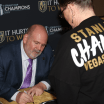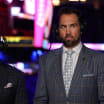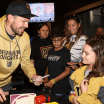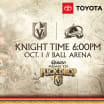Alex Pietrangelo is handed a folded sheet of white paper. As he opens it up and sees it, the father of four can’t help but blurt out a few expletives.
“Oh, (bleep), eh. (Bleep), that’s a long time ago. 2008. How far did you have to go dig to find that one?” asked the 34-year-old Pietrangelo as he studies the game sheet from his first NHL game played on Oct. 10, 2008 in St. Louis.
On Monday, Pietrangelo will play in his 1,000th regular season NHL game. He’s also played in 132 Stanley Cup playoff games.
The 1,000-game club is exclusive. Only 385 skaters and four goalies have done it in NHL history. Pietrangelo becomes No. 386.
“I have a framed copy of this,” he said, digesting the sheet. “I think it's in our house in St. Louis. I'm pretty sure, in the basement. You just forget about that stuff. That's hilarious. The names on both teams are funny. Yeah, time flies. All these guys stick out. Like Walt (Keith Tkachuk) and Paul (Kariya). I don’t know how old they were at that point. Jacks (Barret Jackman), I played a long time with Jacks, right? (David) Backes, obviously, is a close friend of mine. Osh (T.J. Oshie), still playing. Cam (Janssen), ha ha. What a group. What a group. Trotzy (Barry Trotz) was still coaching Nashville. Our coach was Andy Murray, oh man.”
Pietrangelo has had a storied career. Two Stanley Cups. Gold medals from the Olympics, World Cup and IIHF World Junior Championship.
Pietrangelo is a rare breed in today’s NHL: a complete defenseman who plays with physicality and finesse. One of the best defenders in the NHL, he’s also totaled 142 goals and 594 points so far in his career. There are only a handful of players in the NHL who can play like him.
VGK captain Mark Stone marvels at what Pietrangelo has accomplished.
“Durability, playing every night,” he said. “I mean he started at a young age, so what is he, 34? A lot of guys take a lot longer to get it than he did. So, yeah, just consistency and being available to play for the most part and having a long career.
“I think it’s a pretty cool accomplishment. The narrative around the league, to get 1,000 and to get that silver stick is a special accomplishment – there’s not a ton of guys who do it. You’re in elite company with a lot of great ex-players to do it. It’s a special moment for that reason.”
Pietrangelo was captain of the St. Louis Blues when they won the Stanley Cup in 2019.
When he moved on to Vegas, the team got one step closer to being a true Cup contender. After Jack Eichel arrived and in the club’s sixth season, a Stanley Cup was delivered.
“He’s a consistent workhorse. He plays a lot of minutes, plays against top lines, plays the power play and penalty kill,” said Stone. “He’s been one of the top all-around defensemen in our game for a long time. He’s been on Olympic teams and World Cup teams and captained a Stanley Cup champion team. He’s been on another Stanley Cup team. Doesn’t put himself above the team. Really just gives his entire effort for the better of the team. He’s been awesome to have since he stepped into our facilities.”
Stone likes to say he “plays this game to win.” The same clearly can be said about Pietrangelo. And while some players can claim to be just as competitive, few have figured out the balance required to keep things in perspective and to revel in being an ultimate team player.
“We shine with (Pietrangelo),” explains Stone. “He’s changed a lot of the dynamics here on our blue line and he’s helped other defensemen grow and get better. He’s got an endless amount of energy, not just on the ice but off the ice. He’s a real family man and does a lot of things that guys look up to, so I think he’s been an important person in our locker room, obviously for the defense but for younger defense and us forwards.”
Pietrangelo is also very respectful and accommodating with the staff that surrounds the player. When asked to provide some time for this story, he set up shop in the team’s hotel lobby and provided snacks and drinks for the writer and PR staffer who came along to chaperone.
Here's Alex Pietrangelo on the trip to 1,000.
Gary Lawless: How did that happen? That first game.
Alex Pietrangelo: You know what's funny? I’m probably not the only guy who will say it, but I don’t really remember. It’s a long time ago. It was what, 16 years ago? I don't remember a whole lot, that’s for sure. I remember the year because I got sent back to junior. So, I remember practicing. I would have played nine games in like six months. But then I got sent back. That happened again the next year. So, I got used to practicing a lot. I think when you're that age it's really tough to understand why they're doing it. But now I look at where I am in my career. It's kind of hard to argue with. Maybe it made me a better player right, maybe I wasn't ready. They would know better than I. I had mono that summer. The year I got drafted and I was sick. I ruptured my spleen so I couldn't do much all summer. That training camp was a bit of a shock to me because I didn't get a chance to really prepare the way I wanted to. So, maybe that played a part in it too.
GL: What does 1,000 games mean to you?
AP: Sometimes, I have to take a step back, right? I was talking to one of my former teammates, (Michael) Del Zotto. We grew up together. He said that he was proud of me that I've done it the right way, played hard (my) whole career. He was so proud that he was able to be a small part of it growing up and a little bit in St. Louis the year we won. The game is great. I think the people you meet along the way are what makes it special for me. You’re not going to be best friends with everybody you play with, it's just life, but the people we meet along the way are what make the game special. I think in our game we have a lot of really good people. And you have a select few that you become closer with, and you remain close with, but time goes by fast. Let's just say that. I always try and tell our guys that. It's easy to get caught up in the game and get caught up in one game or five games, whatever it is. You’ve got to enjoy it while you can because before you know it, it's not there anymore. And you take it for granted.
GL: You’re only 34. You’re young. Have you thought about the end at all?
AP: You could probably ask any of my teammates, I'm as honest as they come. I know where I am in my career. Have I thought about that? Yeah, I mean, some people are ready for it. Some people aren't. I'm not saying I'm ready to just stop and walk away right now but if I did, I'd be okay with it. I feel like I've put enough into my career that I'd be okay with it. But something still pushes you right? Something still pushes me to keep going every day, to keep wanting to get better, even at 34 and 1,000 games later. For me something inside of me just keeps pushing me to want to keep going. I think that's the internal motivation. I'm a very competitive person. But it's also when you have kids, you want to show your kids what you're capable of, and now my kids are starting to play. They understand. We don't win they ask why. And when we don’t win, they tell me. It's that motivation that kind of keeps you going. You're always trying to find something that keeps you going.
GL: I talked to Stone, Brayden McNabb and Alec Martinez and they all marvel at 1,000 games. Martinez said, ‘I got hurt too much. I couldn’t do it.’ McNabb didn’t get started early enough, and I think Stone is holding out hope to hit 1,000. They said it takes a special player.
AP: I've been fortunate to be healthy, for the most part. It's never going to be perfect. I think the way I play has helped me and I kind of give myself credit. I don't like doing that too often. I've been able to adapt; the game's changed since I started to where it is now. The game has for me, Marty will tell you too and so will Nabber, it's hard to explain how different it is. So I feel like I've found a way to adapt into the different styles of game, which isn't easy to do. But you got to have a lot of things go the right way. And I think, for the longest time, especially when I was in St. Louis, we had a lot of really, really good teams and I was lucky to be on good teams. To try and push for that first Cup was something that really kept you going, right? It's easy to go down a hill saying ‘oh, we can't win, we haven't won, I’ve never won in however many years.’ But it really kept me going. Then I came here it's the same thing, right? You come here and it's, ‘I want to prove something,’ and the goal was to win. Lucky enough it happened only a couple of years in, so that was a bit of a relief. But it's a lot of hockey. It's not always perfect. If I look back on the years as a whole, some years I was good, some years maybe I wasn't. But as a whole I feel like I've tried to play at a certain level, throughout my entire career. I try and push myself to be good every single year.
GL: Have you played with pain a lot?
AP: I played through a lot of stuff. I mean, some stuff they are not going to let you play through, some stuff you can play through. To get to 1,000 games, you have to play through some stuff. It's never going to be easy, there’s always nagging stuff. I’ve played through a lot of different things.
GL: When your daughter got sick, you didn’t even blink though. You couldn’t play hockey. (Alex and his wife Jayne have four kids: Evelyn, Oliver, Theodore and Julia. Last season Evelyn suffered a brain injury and lost motor skills required for eating, talking and walking. Pietrangelo left the team until her prognosis improved and she began to make a recovery.)
AP: Didn't even cross my mind. Didn't even cross my mind. I watched the games and even when I was watching the games, it wasn't like, ‘oh my gosh, I need to get back out there.’ That was the first time in my career that I had no interest, no interest. It was a strange feeling because you're used to being so wrapped up in it. In reality, it controls our life, right? The travel, the games. In the offseason you get some time off. But I just never thought about it. I watched the games when I could and for the first time it was just on the backburner. And in those circumstances, it wasn't very good, but it made me realize what my priorities are, right? And unfortunately, that's not the way I wanted to learn that, but I really learned a hard lesson. What's most important here? If she hadn’t have gotten better, I would have stopped playing no problem. No problem. I am very thankful that it turned out great for us. It’s still an ongoing recovery, but if there was something else that happened and I would have needed to take a year off, no problem, wouldn't have bothered me. It wouldn't bother me because that's the focus. And it's not just her, it's my wife, it's my kids, my other kids. That became my primary focus. And it would have been if that would have happened. We’re just blessed that it didn’t.
GL: 1,000 games is important, but not as important as your family?
AP: Nothing would ever be. If I stopped at 999, but my family was good for the rest of my life, I could care less. At the same time, I don't get to where I am without them. The kids, now, keep me going. They love watching me in warmup. Even my wife, there are games where I come home and I'm just like, ‘what was I doing?’ You go through lulls in the season and she's as honest as they come, and I love her for it. She puts me right back in my place and off I go back to work, and you need that, right? You need that. It’s not criticism. She supports me more than anybody; I don't think I'd be where I am without her. Because especially when you have kids, the late nights, the babies. God bless her. She is the saint for what she was able to do. Especially when the kids were little. The year we won the Stanley Cup, that was the year they were born. They were what, one? Yeah, they were one.
GL: I know the Cup in St. Louis was really special to you. Because it's your first, the first in that city, your wife is from there. In many ways it's your home. Why was the Cup in Vegas special?
AP: It was an emotional decision changing, right? We all had separate lives there and it wasn't easy on us. But I told my wife that we're not going to go anywhere unless I think I had a chance of winning the Stanley Cup. I owed it to her. I said I'm not going to take you anywhere unless I think we can win. I'm going to pick a team where I think we can win. I felt that with Vegas. We won. But even she'll say, get to the first round, second round and in playoffs that's when we really get consumed as players. You're gone for an entire week and spend the whole time in the city. I always laugh because she's like, ‘you might as well win it all because you're not going to go two rounds. You're just wasting my time.’ I always feel that motivation to kind of keep it going. The other thing too is the triplets had an opportunity to sit in the Stanley Cup, see the Stanley Cup. We didn't have Julia at the time (in St. Louis). So now I have all four kids able to enjoy it and the triplets understood it a lot more. And Julia even understood it so I've had all my kids able to experience it, which not many people can say that right? I'm very fortunate.
GL: Who has influenced you along the way?
AP: It’s easy say your parents, right? And I think for us, we all leave home at a young age, so I left at 16 like most players. Your relationship with your parents is funny, right? Because you kind of go through your early 20s and don't want anything to do with them and then you get into your late 20s and all of a sudden, I called my dad probably every day to talk about whatever and life. I really enjoy the friendship that we have now more than anything. I can just talk all day about my wife and my kids. Hockey wise, I've had a lot of good coaches. I've had a lot of people that have really helped me along the way. My first D partner, Carlo Colaiacovo, he's coming in this weekend actually. We've remained best friends. We were in each other’s wedding party. He was the first guy to take me under his wing. That obviously meant a lot to me. Two guys from Toronto, two Italian guys from Toronto. Our families were friends. They would always come down together. I still know his brothers. That's an important relationship especially for a young player. I played a lot of time with Barret Jackman and his wife is from St. Louis, so we had that in common there. Then the guy who wore the “C” before me, probably had the biggest influence: David Backes. I mean, we were as close as you're going to come, two players friendship-wise away from the rink. That was an extremely emotional time for me when he signed in Boston. Again, he’s coming this weekend too. These are the people who not only impact you on the ice but off the ice, and I feel like that really shapes who you are as a person. For me leadership-wise, I learned a lot from David. I was wearing the “A” at the time, but he really showed me behind the scenes how things work.
GL: Who do you consider your peers? There are only a few guys that play like you.
AP: Dewey (Drew Doughty). I mean, there's some remarkable players, right? If you look at me and Doughty, we came up together. We’re kind of similar players, right? I still remember, he won the Norris Trophy with 51 or 56 points. Now you need 85 or 80, whatever it is, or 100, whatever it is. Look at Cale Makar, I think he’s the best defenseman in the world. He came up in an era, like Connor McDavid, they're modern-day players and I have so much respect for what they can do because I can't do that. You just marvel at what they can do and that's just the way the game has changed, right? But I'd say a guy like me, Doughty, because we came up together in the same draft. We've found a way to adapt our game and I've always taken pride in being able to play at both ends of the ice. I don't want to be someone who's just one-dimensional and I think that creates a better team when you have more guys who are willing to play both ends of the ice. If you look at a guy like Stoney, great two-way player, I'll take that guy on my team any day, even Jack is underrated defensively. A lot of guys on our team want to play both ends of the ice and I just take pride in being able to play both ends.
GL: You said to me that the secret to your team is that guys are willing to sacrifice.
AP: Yeah. You have to be willing to give up something for everybody to succeed. It's just a reality.
GL: When did you learn that?
AP: It was later in my career. Let's just say you ask me and Stoney, ‘Do you want to play in every situation, first power play, etc.?’ Yeah, 100%. Everybody wants to. But everybody needs to have a role. And I would take two Stanley Cups, hopefully three, maybe four who knows, over any personal accolade that I could possibly make. Would those be nice? Yeah, it'd be great. But winning is way more fun because day-to-day on the job, it's way more fun. And I enjoy seeing the other guys succeed. I enjoy that. I still want to be part of it. I want to play a big role and I think that's part of why I get paid what I do. But I think everybody's got to give up a little bit of something to the next guy.
GL: What if I say to that’s the reason you haven’t won the Norris and probably won’t?
AP: Then so be it. I’ll take two Stanley Cups.
GL: You just said something really interesting. You said hopefully three, maybe four. When you look at your group, do you guys look at each other and think we have a chance to do something special in terms of multiple Cups?
AP: Yeah, and we didn't really make any changes. Everyone is under contract and we have a GM and an owner that are willing to do what they have to do to make the team better. The cap is going up, so I don't see why not. I don't see anyone in our group leaving anytime soon. And if that happens, it's a place that people want to come and play. But I think that's what makes our group fun. Everyone wants to win and everyone really enjoys where they live, and everybody enjoys where they play. And that starts with the ownership, right? That starts with Bill Foley having that passion and that carries itself down.
GL: You look back at 16 years, 1,000 games. What are the highlights?
AP: Well, there’s been a lot of them. It’d be hard to not say Game 7 against Boston in the Final when I was with St. Louis. I will say last year was the best team I've ever played on. We went into the finals and up and down the lineup, four lines, six D, goalies, we are rolling. But that game against Boston – Game 7, Stanley Cup Final. You can't really write it any better than that. Two good teams going at it. Most of our families from St. Louis flew into Boston. People were getting into altercations in the stands with the Boston fans. You can't write it any better. It would have been great to win at home but there's something special about also winning it on the road. You got to spend that whole night together with your family and then in the locker room with the guys. You can argue both Stanley Cups, but that first Cup is a special moment. I'm appreciative of both, but the second one, I enjoyed watching the other guys winning for the first time more than anything.
GL: I hear you say you're a competitive guy. Can your wires get crossed?
AP: My wires get crossed all the time. Go talk to Marty. Marty’s my whisperer. My wires can get crossed all the time. You can ask our D core. They just keep me in check. The slash on Leon Draisaitl? Do I wish I didn't do it? Yeah, I mean I have a lot of respect for the guy as a player. He's a remarkable player. But I thought there was some stuff in that series that they got away with that they shouldn’t have. I feel like I got him in a place where I knew what I was doing. I could have gotten him in a much worse place. I served my suspension, which is what it is. My teammates did what they had to do in the next game. But sometimes your emotions get the best you.
GL: It was very clear that your teammates wanted to win that game for you against Edmonton. And I saw how you reacted when they came off the ice. Was that a real defining moment for you and your team?
AP: Phil (Kessel) kicked me out of the room we were watching in. He's like, ‘I can't watch the game with you. Get out of here. Get out. I can't watch it.’ I can't imagine what it's like being a GM because you have no control. You put the roster on the ice but you're just watching the game. Coaches have a little bit of control. I felt like we kind of rallied together. When we went into Edmonton the next game like, ‘OK, I know where we stand.’ And that's tough for them because I feel like our group was already tight.
GL: Only 385 guys have a silver stick. I know you've got all kinds of stuff. But will this be special.
AP: Yeah, I don't know where half of it is. It’s kind of hard to misplace a silver stick. The little plaque for my first game can get lost somewhere. When we build our forever home, I'll have a spot for everything. Probably build a nice golf room. Nice golf simulator. I’ve got some ideas in my head already. I'll find a place.
GL: What would you do differently?
AP: If I could change anything, I wish I wouldn't have gotten so wrapped up in the game early in my career and enjoyed it a little bit. I had fun, and I’m not going to say I didn't have fun. But I wish I would have learned to put it on the back burner. It's hard to learn to leave the game at the rink and go home. Easy when you have kids. I'm sure there were some times along the way that my wife had to tolerate me that she didn't deserve. When I was grumpy or upset about nothing. And then when you have kids, that all goes on backburner because there are 800 other things to worry about.
GL: Are you still at the height of your powers?
AP: On the ice? I try to do the best I can every day. My biggest thing is for us as a D core, we're a very, very good D core. And I try and be the best that I can, but I think I just have to be good at what I do. If everybody's just good at what they do, we'll be fine. We kind of slide under the radar a bit as a D core.
Do your job. We have a D core that's like that, right? Theo’s got a role and Nabber’s got a role and Marty. Hey, everyone's got a role. I do stuff that Theo maybe doesn’t want to do, and Theo does a lot of things I can’t do for sure. I respect him for it, and I think that's what we have in our group. That's why I like it.

